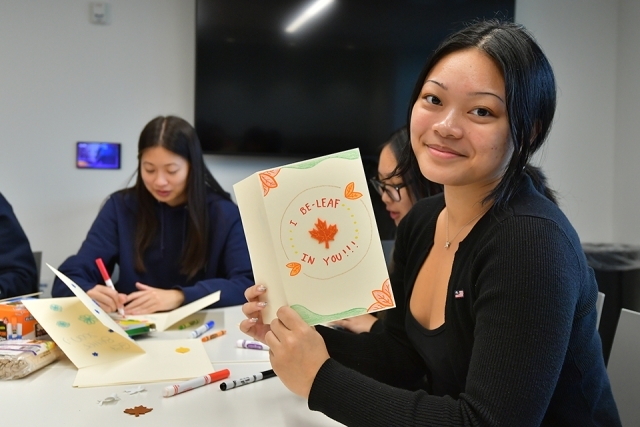
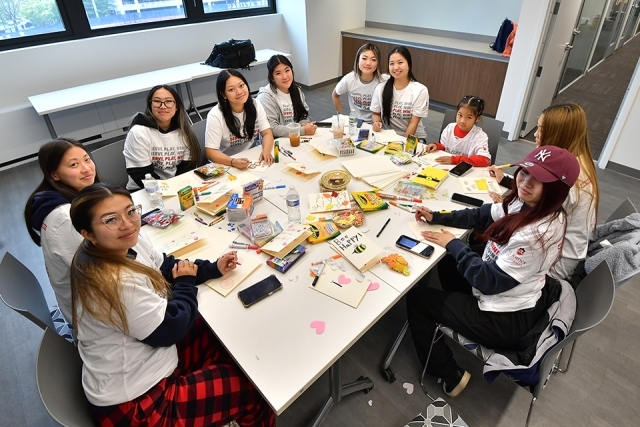
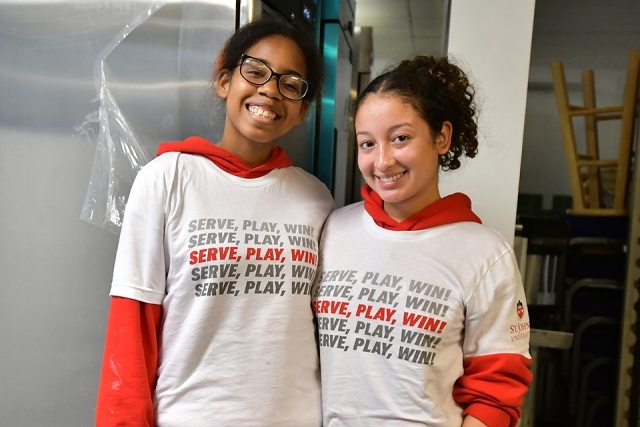
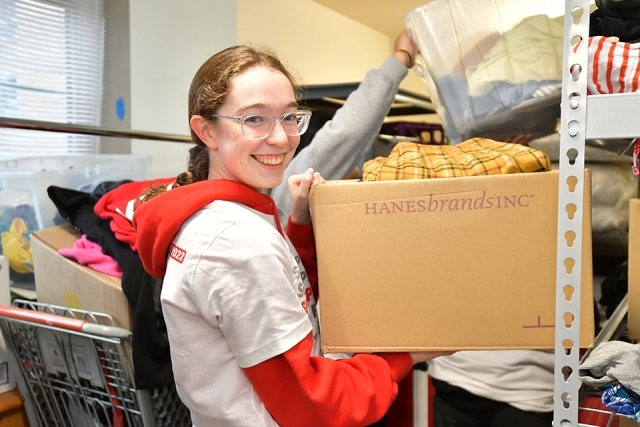
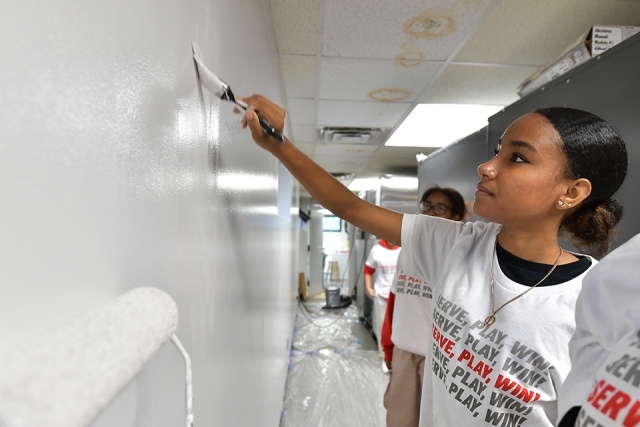
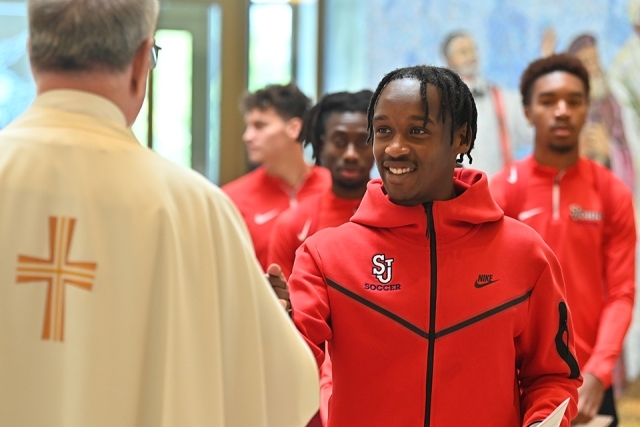
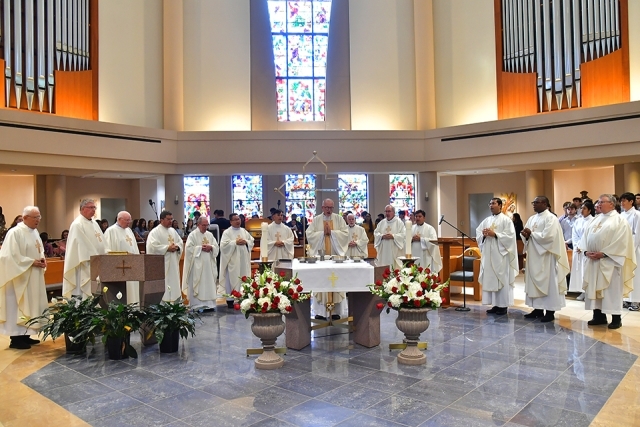
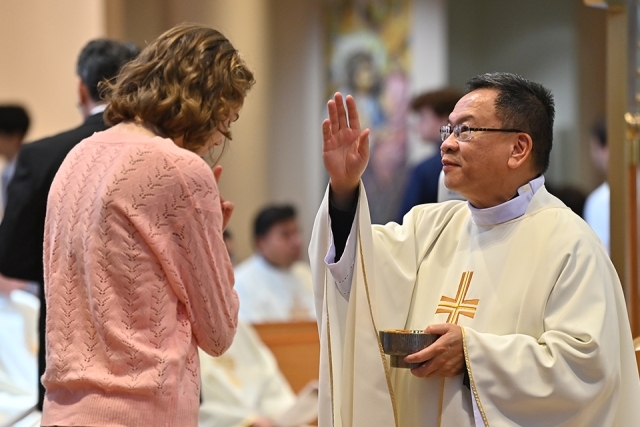
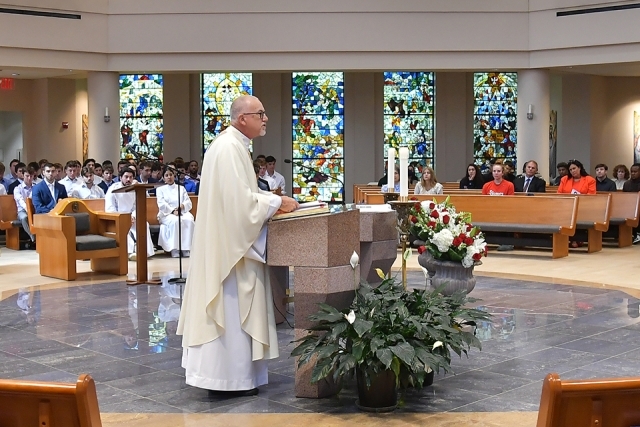
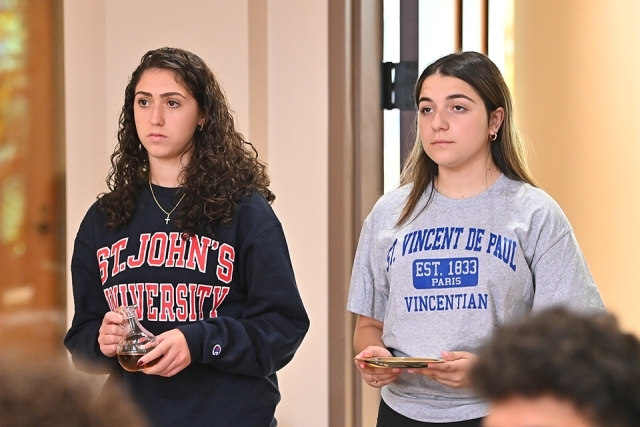
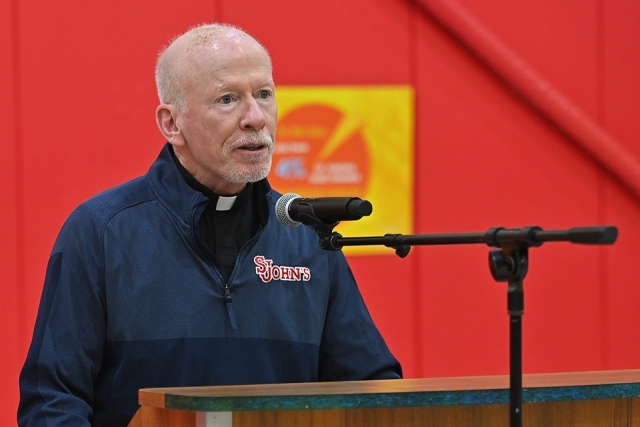
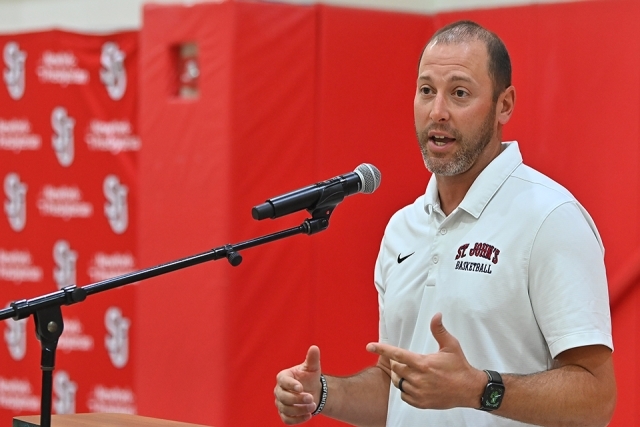
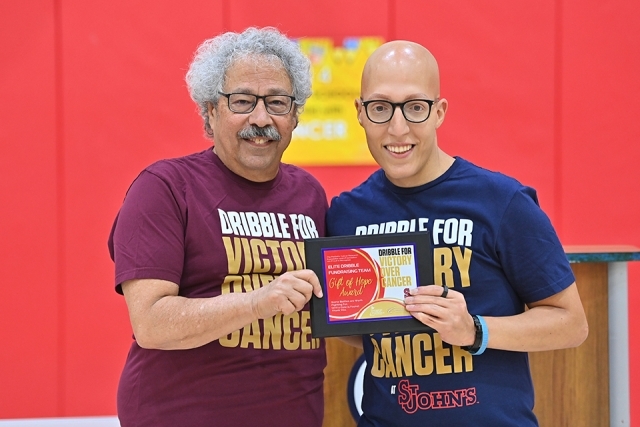
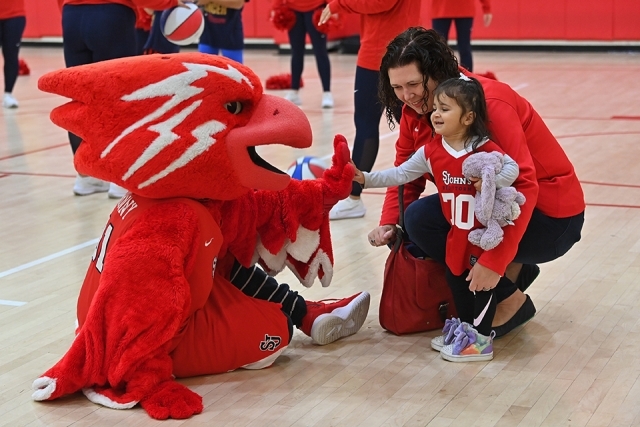
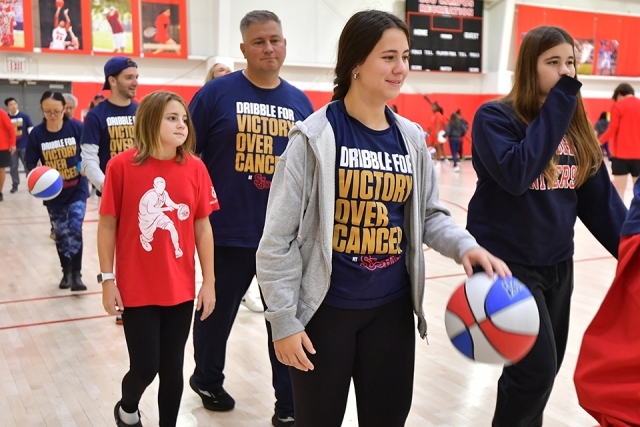
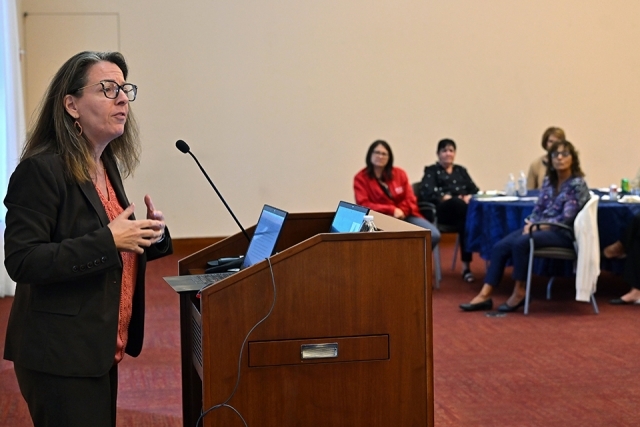
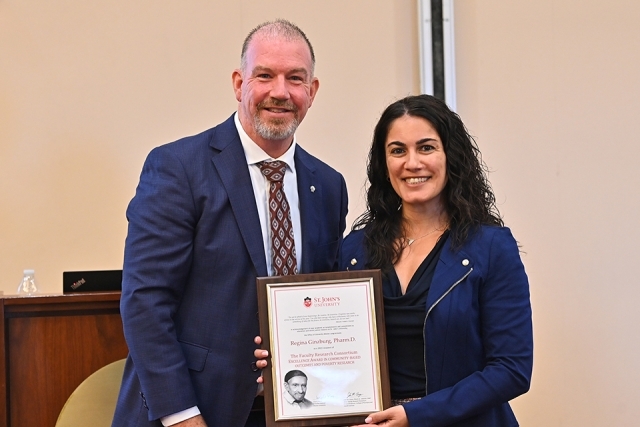

















Listening, one of the greatest virtues of St. Vincent de Paul, was emphasized in this year’s Founder’s Week theme, “Be Vincentian, Be a Listener.”
Founder’s Week is a celebration of St. John’s University’s Vincentian heritage, combining lectures and prayerful reflections with tangible service opportunities, such as University Service Day. The Vincentian Convocation, which celebrates individuals and organizations that walk in St. Vincent’s footsteps, served as the week’s capstone event. Programs were held on the Queens and Staten Island, NY, campuses.
“He knew how to listen to people who had issues, and began to think about the ways in which he could respond,” noted Rev. Patrick J. Griffin, C.M. ’13HON, Executive Director, Vincentian Center for Church and Society.
“He recognized he didn’t have all the answers, so he began to talk to other people who were smarter than him on those issues. That’s why Vincent was this great saint—not because he had all the answers, but because he learned how to listen to other people and began to see the way in which the Gospel played out in his life and in the lives of others.”
He stressed, “We, too, need to learn how to listen.”
At the Administrators and Staff Luncheon held on September 20 in the D’Angelo Center, Sarah Jean Kelly, J.D., Vice President for Student Success and Retention Strategy, presented on the topic of listening as a key to student success. “Listening to our students is key to how we serve them,” Ms. Kelly explained, adding, “and key to creating a culture where they feel valued and inspired.”
She continued, “It means hearing them when they think I’m doing a great job and love my perspective on things, and it really means hearing them when they don’t and think I could be doing better.”
Heather C. Robertson, Ph.D., Associate Professor and Chair, Department of Counselor Education, The School of Education, lectured on “The Art and Science of Listening,” with the focus of becoming an intentional listener, at the Faculty Research Luncheon held the following day, also in the D’Angelo Center.
Intentional listening, Dr. Robertson explained, is listening with the intention of connecting, understanding, and empathizing. “Listening is really an act of service,” she stressed. “We know when we don’t have the time to serve them in the way that listening requires. It’s not that we don’t have time for the person, but the spirit or the service of listening.”
Intentional listening requires cultivating a relationship, Dr. Robertson noted, adding that teachers and supervisors must strike a balance between being approachable and holding their students and employees accountable.
All St. John’s campuses celebrated the 22nd annual University Service Day on September 23, a day in which the St. John’s University family joins together to serve our communities locally, nationally, and globally. More than 200 students participated.
One of Service Day’s cornerstone events was the 13th annual Dribble for Victory Over Cancer held in Taffner Field House. All participants dribble a basketball around campus alongside members of both Red Storm Basketball programs. Due to inclement weather, participants dribbled throughout Taffner for the duration of the event.
As he welcomed participants, Rev. Brian J. Shanley, O.P., President of St. John’s, stressed how proud he was to be president of a university that has a service ethic at its core. “My hope and my prayer is that we educate someone at St. John’s who finds a cure for cancer.”
Fr. Shanley added, “I daresay there’s no one in this room whose lives haven’t been touched by cancer. I lost my father and my twin brother to cancer.” He also knows several friends currently battling this scourge. “Cancer touches all of our lives, and we have a say in what happens today.”
Service Day offered a wealth of opportunities both on and off campus, including a 5K walk to support the Long Island chapter of the Society of St. Vincent de Paul at Cedar Creek Park in Seaford, NY, and crafting positive, uplifting cards for the nonprofit charitable organization Cards for Hospitalized Kids.
The Vincentian Heritage Lecture, delivered by historian Bronwen McShea, Ph.D., M.T.S., was held on September 25 in the School of Law’s Belson Moot Courtroom. Entitled, “The Saint and the Duchess: Collaboration at the Heart of Vincentian Heritage,” Dr. McShea discussed the unique relationship between St. Vincent de Paul and the Duchess of Aiguillon, the niece of Armand Jean du Plessis, known more commonly as Cardinal Richelieu.
Dr. McShea noted that she chose to speak about this relationship to highlight the role of the laity, specifically lay women, in the history of Vincentian projects over the years. Because France was such a hierarchical society, St. Vincent de Paul needed wealthy, noble patrons both to support his education and formation as a priest.
“If you wanted to engage in any special ministries to the poor, outside of a normal parish context, you needed wealthy, powerful people to make this happen,” she explained.
St. Vincent met the Duchess while he was in his late forties and she was in her twenties. She helped bring his commitment to serving the poor, especially in neglected rural communities, to the attention of her uncle, who was one of the most powerful statesman in the French court. Some early projects of Vincent’s the Duchess and her uncle supported included the education of young Vincentian seminarians in Paris, the establishment of the Vincentian community and its outreach to the rural poor, and the community’s first missions around the world.
“The Vincentians, with the support of the Duchess and her uncle, would begin to make real differences in the lives of some of these poor Catholics from the 1630s onward,” Dr. McShea stressed.
During a Vincentian Service Fair held the same day in the D’Angelo Center, several students shared their reasons for seeking opportunities to help those in need. “Service is one of the things that makes St. John’s what it is,” explained Joshua Souane, a graduate student studying Data Science. Of course, the mission is to educate, but it is also to serve the community. That’s a pillar of this University and you can see it and feel it.”
Jelani Estrada, a graduate student majoring in Public Health, who was also representing the Vincentian Institute for Social Action, said, “St. John’s is rooted in the values of St. Vincent de Paul. In giving back to the community, we know we can’t solve all of society’s problems, but we can take it one step at a time by feeding the homeless and helping stock food pantries. Our organization is rooted in the way St. Vincent de Paul lived his life. I do a little bit of everything—from serving on committees to driving the van to service opportunities.”
Founder’s Week concluded on September 27 with a Mass celebrating the Solemnity of St. Vincent de Paul in St. Thomas More Church on the Queens campus. During his homily, Rev. Aidan R. Rooney, C.M., M.Div., M.Th. ’78NDC, Executive Vice President for Mission, told the congregation that St. Vincent de Paul’s vision of Christ was as an evangelizer of the poor.
Fr. Rooney noted that in the 30 years prior to His ministry, Christ listened. “In His human nature, He learned and grew. As the crucified and risen one, He identifies with and makes His home within the poor themselves.”
The Congregation of the Mission, also known as the Vincentians, were founded on one principle, Fr. Rooney explained: that Christ had, in a very real way, disappeared into the world of the poor. “All members of the Vincentian family strive to live in conformity with the Gospel, and especially with the spirit of Jesus as defined in that Gospel.”
“The heart of being a Vincentian,” Fr. Rooney stressed, “is in the doing, in the encounter. Anyone who wants to risk this privileged encounter, anyone who is willing to risk being transformed forever, can walk along with this family.” What Vincent was able to accomplish in his life, Fr. Rooney continued, “came out of that deep listening to the Word of God and familiarity with Jesus.”
Related News
Answering the Call: Carolyn Moglia Finds Her Stride in St. John’s First Nursing Class
When nursing student Carolyn Moglia walks across the Commencement stage this May, she won’t just be earning a diploma, she’ll be making history. As a member of the first graduating cohort of St. John...
St. John’s Cybersecurity Team Continues Run of Success
For the first time since 2019 and only the second time in its history, St. John’s University’s cybersecurity team has advanced to the regional finals of the Northeast Collegiate Cyber Defense...
St. John’s Conference Highlights Challenges in Insuring of Art and Collectibles
The challenges facing the risk management industry from an evolving art and collectibles sector were the subject of a groundbreaking conference hosted by The Peter J. Tobin College of Business’ Center...
